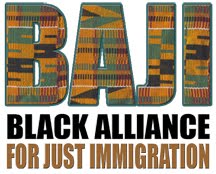Thanks to all who joined us for our first Teleconference in the series 'Black Intersections on Migration'. Our first Teleconference was entitled, Slavery As Immigration based on the work of Rhonda McGee.
You can listen to Rhonda McGee's presentation and teleconference discussion here:
http://www.priorityafrica.org/African_Immigrants.html
Slavery in America was a crime against humanity, a foundational wrong without equal in American history. In “Slavery as Immigration?,” Professor Magee continues her career-long effort to understand the deep impact of the foundational wrong of slavery on American law and social policy. A great-granddaughter of enslaved and segregated workers in the American South, Professor Magee seeks to open up a dialogue among African-American people about the aspects of the Black American experience of slavery and segregation that tell a particularly devastating kind of immigration story.
Her goal is not to minimize the significance of the Black experience as distinctive in American history – far from it. Instead, her goal is to call boldly for national reflection on the elements of the Black American experience that provide a founding plank for longstanding American immigration law and policy, including the importation and deportation policy of racially-identified, socially isolated and politically marginalized people for work at the bottom of the economic system.
Indeed, Professor Magee argues that the forced migration, internal displacement, and denial of citizenship strategies essential to chattel slavery were important components of America’s original immigration and citizenship policy, with legacies impacting immigration and citizenship law and policy to the present day. Further, she argues that the failure of Black Americans to understand the historical impact of slavery (and segregation) on immigration law and policy does more than constitute a gap in our understanding of the historical importance of slavery in America -- a gap we should address for the sake of our own enrichment. More practically, it keeps Black Americans on the periphery of critical debates about increasingly important issues within contemporary American politics – a position we ignore at our political and social peril.
January 29, 2011
January 25, 2011
Teleconference series: Black Intersections on Migration
The Black Alliance for Just Immigration and Priority Africa Network
Invite you to:
Black Intersections on Migration
National Conversations on African, African American,
Afro-Caribbean and Afro-Latino Migrations to and in the U.S.
Invite you to:
Black Intersections on Migration
National Conversations on African, African American,
Afro-Caribbean and Afro-Latino Migrations to and in the U.S.
A four-part series of teleconference briefings
on timely and critical analyses of migration, race, and identity.
on timely and critical analyses of migration, race, and identity.
The United Nations has declared 2011 as the “International Year for Peoples of African Descent”. Ten years ago, landmark recommendations were made at the World Conference against Racism, Racial Discrimination, Xenophobia and Related Intolerance in Durban South Africa. In a four-part series of teleconferences that looks at the span of Black presence in the U.S. over the centuries, we will examine the unique migration experiences of the African Diaspora within the context of U.S. history and the current debate over immigration. The series brings provocative frameworks and analyses into the discussion about race and immigration that are seldom considered.
Teleconference I
Slavery as Immigration?
Thursday, January 27, Noon Pacific, 1PM Mountain, 2PM Central & 3PM Eastern
Speaker: Rhonda Magee, Professor, University of Francisco School of Law
Slavery in America was a crime against humanity, a foundational wrong without equal in American history. In “Slavery as Immigration?,” Professor Magee continues her career-long effort to understand the deep impact of the foundational wrong of slavery on American law and social policy. A great-granddaughter of enslaved and segregated workers in the American South, Professor Magee seeks to open up a dialogue among African-American people about the aspects of the Black American experience of slavery and segregation that tell a particularly devastating kind of immigration story.
Her goal is not to minimize the significance of the Black experience as distinctive in American history – far from it. Instead, her goal is to call boldly for national reflection on the elements of the Black American experience that provide a founding plank for longstanding American immigration law and policy, including the importation and deportation policy of racially-identified, socially isolated and politically marginalized people for work at the bottom of the economic system.
Indeed, Professor Magee argues that the forced migration, internal displacement, and denial of citizenship strategies essential to chattel slavery were important components of America’s original immigration and citizenship policy, with legacies impacting immigration and citizenship law and policy to the present day. Further, she argues that the failure of Black Americans to understand the historical impact of slavery (and segregation) on immigration law and policy does more than constitute a gap in our understanding of the historical importance of slavery in America -- a gap we should address for the sake of our own enrichment. More practically, it keeps Black Americans on the periphery of critical debates about increasingly important issues within contemporary American politics – a position we ignore at our political and social peril.
Toll-free Dial-in (US/Canada): 1-866-931-7845
International Dial-in: 1-310-374-4949
Conference Code: 904167
Please RSVP by calling (510) 663-2254 or sending an email to teleconference@blackalliance.org
International Dial-in: 1-310-374-4949
Conference Code: 904167
Please RSVP by calling (510) 663-2254 or sending an email to teleconference@blackalliance.org
Teleconference II – Thursday, February 24: African American Migrations—The Exodus from the U.S. South
Speaker: Isabel Wilkerson, author, “Warmth of Other Suns: the Epic Story of America’s Great Migration” (Invited).
Teleconference III – Thursday, March 31: New African Immigrants—Grappling with Concepts of Race and Identity
Speaker: Jackie Copeland Carson, PhD, President Copeland-Carson and Associates and author of “Creating Africa in America: Translocal Identity in an Emerging World City”.
Teleconference IV – Thursday, April 28: The Afro-Caribbean and Afro-Latino Migrations to the U.S.
Speaker: Janvieve Williams Comrie, Executive Director, Latin American and Caribbean Community Center
All briefings are at Noon Pacific, 1PM Mountain, 2PM Central & 3PM Eastern
Subscribe to:
Posts (Atom)



